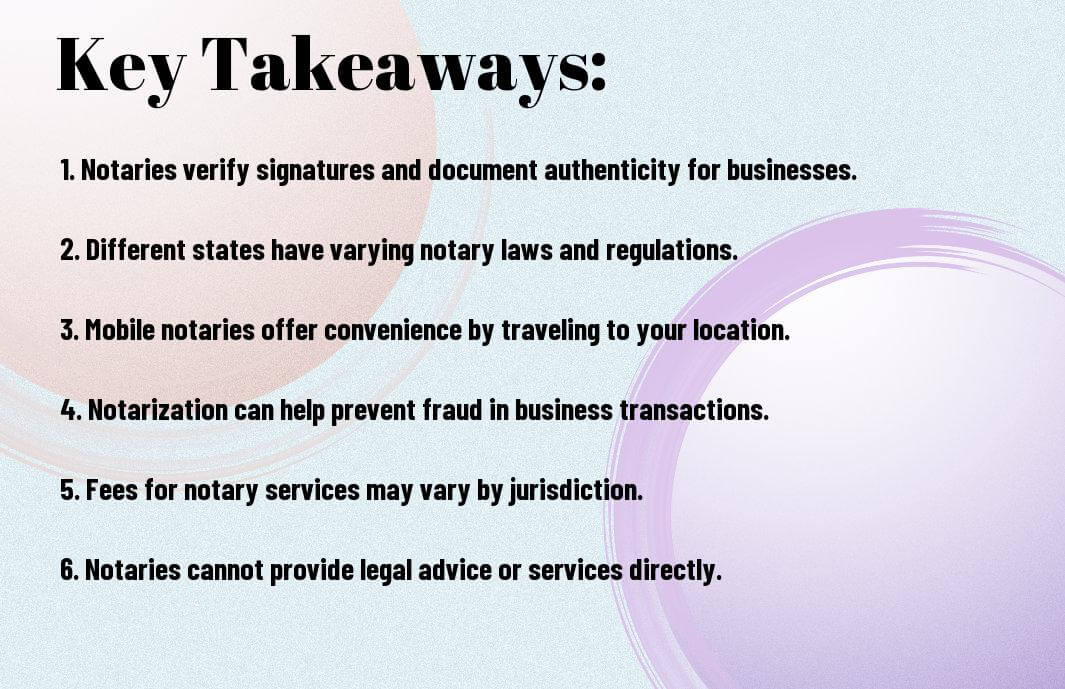Just as you navigate the complexities of legal documentation, understanding apostille services in the UK can greatly simplify your international endeavors. Apostilles authenticate your documents for use abroad, ensuring they meet the legal requirements of foreign countries. This guide will provide you with vital insights into the process, the types of documents that require an apostille, and how you can efficiently secure this important certification. Whether you’re pursuing work, study, or personal relations overseas, having a clear grasp of apostille services is vital to your success.
Key Takeaways:
- Apostille Process: The apostille process is a method of authenticating documents for use in foreign countries that are members of the Hague Convention.
- Document Eligibility: Not all documents are eligible for apostille; common documents include birth certificates, marriage licenses, and business documents.
- Service Providers: Various authorized service providers can assist with obtaining an apostille, including legal firms and dedicated apostille services.
- Turnaround Time: The processing time for apostille services can vary; it’s important to check with your service provider for specific timelines.
- International Usage: An apostille ensures your document is accepted internationally without the need for further authentication by consulates or embassies.
What is an Apostille?
Before stepping into the details, it’s vital to understand what an apostille is. An apostille is a certificate that authenticates the origin of a public document for use in countries that are part of the Hague Apostille Convention. For more information on what is an apostille certificate, continue reading, as this service simplifies the process of validating documents abroad.
Definition and Purpose
Across various international contexts, an apostille serves as verification that the document in question is genuine and complies with the legal requirements of the country of origin. This allows you to present your documents in foreign nations with confidence, knowing they hold legal weight.
Historical Context
Across history, the need for document authentication has evolved significantly. The Hague Convention of 1961 established the apostille as a streamlined solution to simplify the process of legal document validation across member countries, thereby reducing the complexities involved in international legal matters.
Plus, this convention was a landmark step in facilitating cross-border document use, allowing countries to recognize each other’s legal systems. Before the apostille, individuals often faced tedious processes, including lengthy legalizations through embassies. By establishing common rules, the apostille promotes global cooperation and enhances the trust in international legal transactions, making it easier for you to navigate legal matters in different jurisdictions.
The Apostille Process in the UK
It involves a streamlined procedure where you can authenticate documents for use in foreign countries. The Apostille process, governed by the Hague Convention, simplifies the verification of documents to ensure they are valid and legally recognized internationally. Depending on the nature of your document, you may require additional steps before receiving your Apostille certificate.
Types of Documents Eligible for Apostille
It’s vital to understand which documents are eligible for an Apostille. Common document types include:
- Birth and marriage certificates
- Educational certificates and diplomas
- Business documents, such as company incorporation certificates
- Power of attorney documents
- Legal documents, like court orders
Assume that your document falls within these categories, and you can proceed with your Apostille application.
| Document Type | Description |
| Birth Certificate | Official record of an individual’s birth |
| Marriage Certificate | Official record of a legal marriage |
| Educational Certificates | Proof of educational qualifications |
| Business Documents | Official company registrations and filings |
| Legal Documents | Documentation related to legal matters or proceedings |
Steps to Obtain an Apostille
At the outset, gathering the necessary documents and verifying their eligibility for Apostille authentication is vital. Once you have all required documents in hand, you can either submit them yourself to the relevant authority or choose to use a professional service to expedite the process.
Plus, once submitted, the processing time for an Apostille typically varies based on the method of submission and the authority handling your application. You should anticipate a standard processing period of between a few days to a couple of weeks. Using a reputable service can help ensure your documents are adequately prepared, minimizing delays and complications during verification.
Agencies Offering Apostille Services
For anyone seeking to authenticate documents in the UK, various agencies provide apostille services to facilitate this process. These agencies can be categorized into government entities and private service providers, each offering distinct advantages and services tailored to your needs. Understanding the differences between these options will help you choose the best path for obtaining your apostille swiftly and efficiently.
Government Agencies
By contacting government agencies, you can obtain an apostille directly from an official source. In the UK, the Foreign, Commonwealth & Development Office (FCDO) is responsible for issuing apostilles under the Hague Convention. They ensure the authenticity of your documents, helping you meet the legal requirements needed for international recognition.
Private Service Providers
Before opting for private service providers, you should consider how they can expedite the apostille process. These companies often offer faster turnaround times and additional services such as document retrieval and courier options, which can be particularly beneficial if you are pressed for time.
Further, private service providers may offer personalized assistance throughout the entirety of the apostille process. They can guide you through documentation requirements, ensuring that everything is in order before submission. This support can help alleviate any concerns you may have about missing information, making the experience smoother and more efficient. Additionally, they often have established relationships with government offices, which can further expedite your request.
Costs Associated with Apostille Services
Now that you understand the importance of apostille services, it’s imperative to consider the associated costs. The fees can vary significantly depending on several factors, including the type of document you need to authenticate and the service provider you choose. Being informed about these costs will help you budget appropriately and ensure a smooth process when obtaining your apostille.
Breakdown of Fees
Between the basic government fee for the apostille and any additional charges imposed by service providers, the total cost can add up quickly. Typically, you can expect the following fee breakdown:
- Government fee for the apostille
- Service provider fees
- Shipping and handling fees
- Expedited service fees, if applicable
Factors Affecting Pricing
Apostille services can vary widely in pricing due to several factors that you should consider when making your decision. These factors include:
- Type of document requiring an apostille
- Turnaround time for processing
- Service provider’s reputation and expertise
- Whether you opt for additional services (like document translation)
Perceiving the complete landscape of costs and available options will empower you to make informed choices based on your specific needs.
To research deeper, you should also evaluate how the complexity of your documents may influence pricing. For instance, different types—for example, personal versus commercial documents—carry varied requirements and can sway the cost. Additionally, the faster you need the service, the more you may have to pay. Overall, assessing these elements can guide you to find the most suitable apostille service for your circumstances.
- Document type complexity
- Speed of service needed
- Additional authentication requirements
- Geographic location of the service provider
Perceiving these factors helps you anticipate and manage potential pricing variations efficiently.
Common Challenges and Solutions
Not everyone is aware of the complexities involved in obtaining an Apostille in the UK. You may face obstacles such as delays, misinterpretation of document requirements, or improper submission. To avoid these issues, it’s beneficial to Get your document legalised: Overview, which provides step-by-step guidance.
Delays in Processing
With the increasing demand for Apostille services, you might experience delays in processing times. To mitigate this, consider submitting your documents in advance and opting for expedited services when available. Keeping track of your application can also help you stay informed on its status.
Misunderstanding Document Requirements
Behind the scenes, many applicants struggle with understanding what documents need legalization and their specific requirements. This often leads to unnecessary setbacks in the Apostille process.
Common misunderstandings include confusion over the types of documents that require an Apostille and the necessary accompanying paperwork. To clarify your requirements, consulting the official guidelines or seeking professional advice can be beneficial. Taking time to ensure you have the correct documents and understanding their specifications will streamline the process significantly.
Importance of Apostille for International Use
To ensure your documents hold weight across borders, obtaining an apostille is vital. This certification guarantees the authenticity of your documents, making them legally recognized in countries that are part of the Hague Convention. Without this verification, your paperwork may lose its intended value in international dealings, potentially complicating your personal or business transactions. By securing an apostille, you safeguard your interests while facilitating smoother interactions abroad.
Legal Recognition Abroad
Any document that has not been apostilled risks being deemed illegitimate in another country. This can lead to significant complications, including delays in processing legal matters, financial transactions, or recognition of qualifications. To avoid these issues, it is vital that you have your documents appropriately apostilled before they are presented in foreign jurisdictions.
Impact on Personal and Business Matters
Any delay or rejection in international document recognition can significantly impact your personal and business matters. Whether you are relocating, getting married abroad, or engaging in international trade, an apostille ensures your documents are accepted. This certification streamlines processes, facilitates trust, and enhances your credibility when dealing with foreign entities.
Personal matters such as marriage, adoption, or property dealings can become complex when dealing with foreign authorities. Without an apostille, your documents may be rejected, leading to delays and added stress. Similarly, businesses face challenges in global dealings without proper documentation. By apostilling your documents, you ensure they meet international requirements, enhancing your ability to thrive in the global marketplace.
Summing up
To wrap up, understanding Apostille services in the UK is vital for ensuring that your documents are recognized internationally. By familiarizing yourself with the process, regulations, and requirements, you can effectively navigate the complexities of document authentication. This knowledge empowers you to ensure that your personal, legal, and business documents hold the validity they need abroad, protecting your interests and aiding in smoother interactions across borders.
FAQ
Q: What is an apostille and why is it necessary in the UK?
A: An apostille is a certificate that authenticates the origin of a public document for use in foreign countries. In the UK, apostilles are issued under the Hague Convention, which ensures that documents signed in one member country are recognized in another. This is necessary when you need to present documents, such as birth certificates or educational qualifications, in a foreign country, ensuring that they are deemed valid and legally binding.
Q: How can I obtain an apostille for my document in the UK?
A: To obtain an apostille, you must first ensure that your document is an original or a certified copy of a public document. You can then submit the document to the UK Foreign, Commonwealth & Development Office (FCDO) along with an application form and the appropriate fee. This process can be completed by mail or in person at designated offices. If required, you may also engage an apostille service provider to assist with the process.
Q: How long does it take to receive an apostille in the UK?
A: The processing time for obtaining an apostille can vary. Generally, it takes about 2-10 working days if submitted through the FCDO. However, expedited services may be available for an additional fee if you need the apostille more quickly. If you use a private service provider, the turnaround time may be shorter, depending on their specific procedures.








